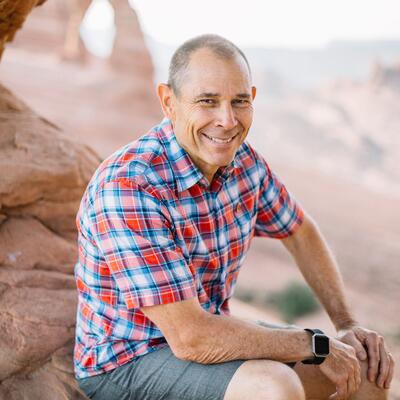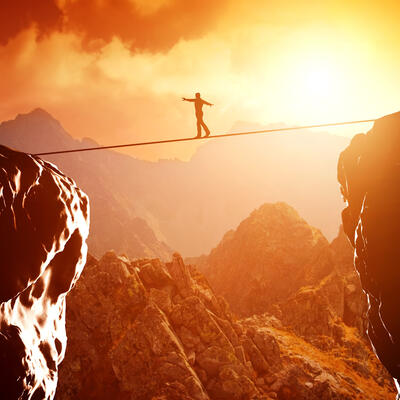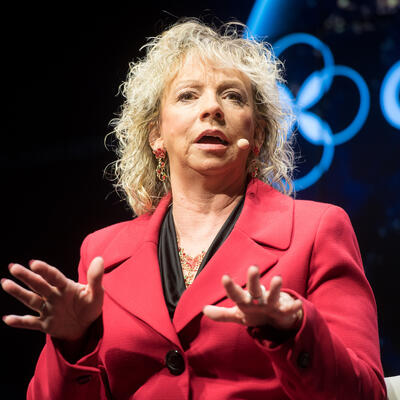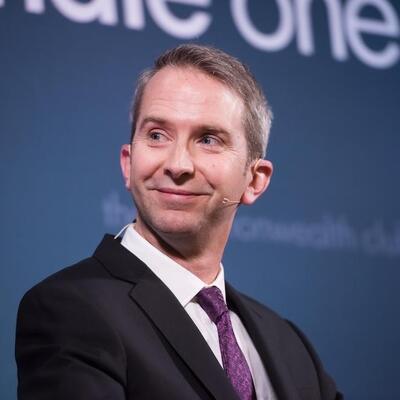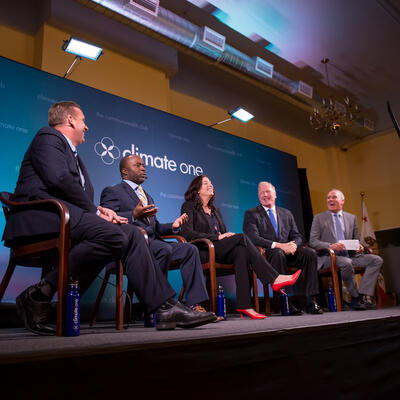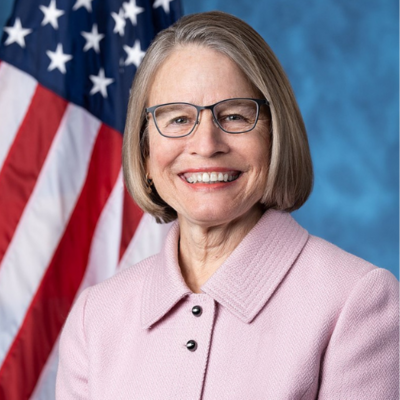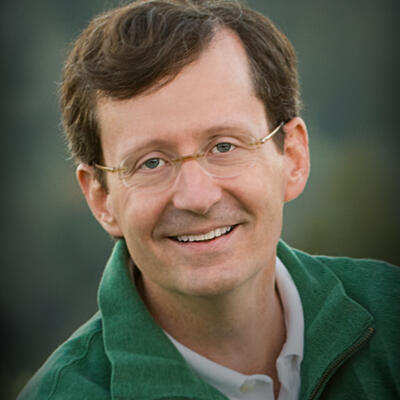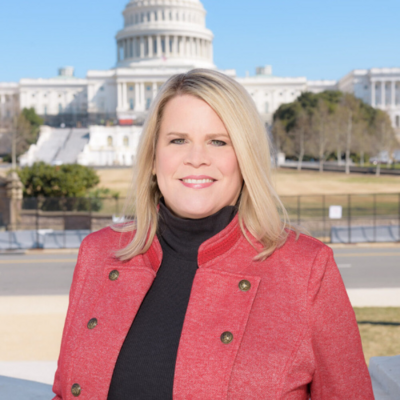
Republicans and a Democrat on Climate
Guests
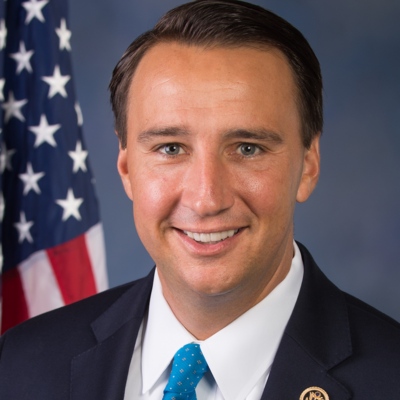
Ryan Costello
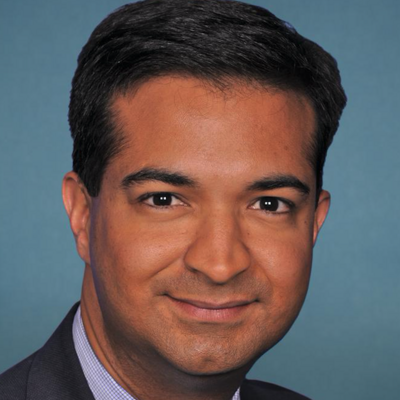
Carlos Curbelo

Christine Pelosi
Summary
The Green New Deal is shaking up climate politics in Washington. The resolution’s ambitious clean energy goals are championed by several leading Democrats — but are criticized by Republicans for being costly and unrealistic. With an increasing number of Green New Deal alternatives being put forward by Democrats, the pressure is on Republicans to propose an actionable climate plan of their own.
Is there such a thing as a bipartisan climate solution? Join us for a conversation with two Republicans and a Democrat about the politics of energy leading up to the 2020 campaign.
Full Transcript
Greg Dalton: This is Climate One, changing the conversation about energy, the economy, and the environment.
During the 2016 presidential election, climate change barely surfaced as a campaign topic. This cycle it’s a different story.
Carlos Curbelo: It’s gonna be the first election where it's a major issue. And we can thank, I don't support it, but we can thank the Green New Deal for that. [:08]
Greg Dalton: Democrats have rallied around the Green New Deal and its lofty promise of a clean energy future. But more and more, Republicans find that they ignore the topic of climate change at their peril.
Carlos Curbelo: Republicans are saying, yeah, we’re against the Green New Deal, it's horrible, all the things they say, and then they're being asked what are you for. [:08]
Greg Dalton: Still, even some Democrats have found themselves caught between the ominous threat of a destabilized climate and other more immediate concerns.
Christine Pelosi: It may be true that the ecology as we know it is going to change in a dozen years, but your change is gonna change my family's economy in two years. [:08]
Greg Dalton: Republicans and a Democrat on climate. Up next on Climate One.
Greg Dalton: Climate One conversations feature oil companies and environmentalists, Republicans and Democrats. I’m Greg Dalton.
Greg Dalton: These days, Republicans and Democrats don’t agree on much. But as more and more lawmakers are coming to realize, no matter which part of the country they represent, their communities are facing catastrophic change due to global warming.
Ryan Costello: If you’re along the coast, rising sea levels…If you're in the Midwest, the land that you can grow on has shrunk, your crop season has shrunk. If you're in Oregon and Northern California the wildfires and on and on and on. [:13]
Greg Dalton: That’s Ryan Costello, former Republican congressman from Pennsylvania. He now manages Americans for Carbon Dividends, an advocacy group that is supported by oil companies and promotes a price on carbon emissions.
Oil companies backing a climate plan - with relatively small amounts of money this time and not just words - shows that the politics of climate are shifting on the right. Christine Pelosi, executive committeewoman of the Democratic National Committee, says she sees the divide as more regional than partisan.
Christine Pelosi: What we need to do regionally, and within industrial and indigenous communities in particular, is have that basic dialogue where someone is saying your industry is poisoning my water. And the other person says, okay but I need a job; what job am I gonna get if I’m not in the industry that happens to have run off that poison in your water? [:20]
Greg Dalton: Many Republicans fear that voicing support of climate solutions could torpedo their chances for reelection. Carlos Curbelo is a Republican who co-founded the bipartisan Climate Solutions Caucus in Congress and represented the southern tip of Florida until he lost in 2018. He says it’s time to put country ahead of career.
Carlos Curbelo: So, yeah, perhaps leading on climate could make some Republicans vulnerable in a primary, perhaps negotiating with Republicans could make some Democrats vulnerable in a primary, too bad - that's what you signed up for and we need you to do your job.
Greg Dalton: On today’s program I’ll talk with Carlos Curbelo, Christine Pelosi and Ryan Costello about the politics of climate: the ways that each party sees it differently, and where, believe it or not, they come together. We’ll also discuss proposed solutions coming from both sides of the aisle, and how climate change will figure into the 2020 election season.
Curbelo began by telling us that, for the South Florida community that first elected him to congress in 2015, the issue is very close to home.
PROGRAM PART 1
Carlos Curbelo: A lot of people ask me what got you into climate policy, environmental policy. And I think a lot of times they’re expecting to hear some dramatic story or maybe that I had a dream or something and that's not at all what happened. I just realized I learned about the issue and I realized that this is a local challenge for my community of course it's a global challenge. But in my community an area that is at about sea level and where most people live near the sea. The threat is real, it's imminent we get tidal flooding, our drinking water supply is threatened by saltwater intrusion. So that's why I decided to get involved.
In 2015, when I got to Congress with Ryan, there were maybe three or four Republicans in the house who were even willing to acknowledge climate change this reality that we’re facing. And having a lot of one-on-one conversations and starting the bipartisan Climate Solutions Caucus which was the first of its kind an effort to establish a dialogue and then cooperation between Republicans and Democrats in Congress. We really started changing things.
So I think we bottomed out at least when it comes to Congress in 2014, ’15. I think things are headed in the right direction now we just need to accelerate the process because time is running out.
Greg Dalton: Christine Pelosi, we also heard that it’s local it's not top of mind for a lot of voters. It's a local issue, but local people can't solve the problem and it's not a top voting issue.
Christine Pelosi: Well I think that that might change. We are two blocks from the seawall here as we speak here in San Francisco. This is my neighborhood and we just passed a big ballot measure in order to shore up the seawall. So it’s a little more top of mind for us here. But I think that for people sometimes an issue is so big that you feel powerless.
And so it’s our job as activists to say what are the concrete steps that I can take in my consumer choices in my voting choices and if I’m given an option to think globally and act locally, will I be empowered to do that. And California I think has had because of our relationship to the coast we fought offshore oil drilling so we’re now fighting that again with Trump. So I think for a lot of people it feels like Groundhog Day because a lot of the issues that we grew up fighting in 80s and 90s we’re fighting again now. Hopefully with a little more wisdom and a little more coalition building.
Greg Dalton: Ryan Costello, your former district doesn't touch on the sea. It’s the suburbs of Philadelphia and some rural areas. How is climate affecting the people you used to represent in Congress?
Ryan Costello: A hotter months of the year, hotter years, more extreme, I mean we had a tornado watch last week. So what you're finding whether you’re in Pennsylvania whether you're in Kansas whether you’re in Oregon wherever you are, you're seeing more extreme weather patterns. So instead of a hurricane two, you're getting a hurricane four, maybe I got that backwards. What I think to pick up the conversation is that in every single community in this country you are able to identify a few changes to the detriment of all as a consequence of a changing climate. If you’re along the coast, rising sea levels. Threats to literally your infrastructure and your homes. If you're in the Midwest, the land that you can grow on has shrunk, your crop season has shrunk. If you're in Oregon and Northern California the wildfires and on and on and on. And we discover that and I think that this is really where the conversation has to go now in the next few years to come is what the cost of climate change truly is.
Because I don't think that any one particular voter has a full appreciation for that on a macro level. They tend to focus it on a micro level and then they ask the question, well, I know I have this little problem here but how is carbon pricing or how is this regulation, how is that gonna fix my backyard. And I think that that's one of the challenges that we have in political discourse.
Greg Dalton: Right. And Carlos Curbelo, we often talk about, oh, we can't do this fix because it will cost too much. But people don't think about the cost of not fixing it, right. We had Harvey, Maria, Irma, Midwest floods oh yeah Florence in the Carolinas and I mean we’re up over $100 billion in damages for these things not entirely caused by climate but partly. So how do you address the cost of, you know, versus the cost of inaction and the cost of action. Because it’s always the cost of action that seems to be too much.
Carlos Curbelo: Right. And that's the challenge that in many ways this is still an invisible issue despite everything that Ryan has explained because well there's a natural disaster Congress just pass as a supplemental bill and then that solves everything. But a lot of people don’t realize we’re paying for that. I mean those are resources that we won't be able to use either today or in the future on education on transportation and all the other national priorities. So I would spent a lot of time in my district just educating voters. And I think everyone in elected office needs to educate voters and those of us who care about this issue, activists as well. We need to spend time educating voters with the mindset that we’re trying to convince them not lecture them or shame them. Because I think that's the most effective way to bring people to our side and your--
Greg Dalton: Do you think Democrats do that sometimes?
Carlos Curbelo: Well, look, with all of these controversial issues everyone has a choice, right. We can either exploit the issue for maximum political benefit or we can work toward solutions. But that doesn’t mean you can't do both, because obviously come campaign season there are contrasts to be drawn but I think especially after campaigns we need to find ways to work together. And the truth is, of course Republicans are responsible because for two decades they just balked on the issue completely, but in some ways I think Democrats and some liberal groups have been complicit because they've doubled down on this dynamic in our country, where Republicans don't want to be part of the solution, don’t want to have a conversation. And Democrats want to own the issue entirely.
We live in a country where the founding fathers established the government that’s designed to work by consensus. That's why there was a meeting in the White House today to talk about infrastructure because if the White House and the Democratic leadership and the Republican leadership in Congress don't agree, nothing is going to happen. And what I think all of us have to decide is, if we’re Democrats do we want to wait for the day when we have 65 Democratic senators a big house majority and a Democratic president are we gonna wait for that day to hopefully have a chance to solve the challenge of climate change or are we going to try to win over some Republicans through sincere dialogue. So that we can get a durable solution if not today, in the near future. And what I tried to do during my four years in Congress is to try to build out that coalition from the middle out. I think we made a lot of progress we went from having 4 or 5 Republicans in the house who are even willing to acknowledge this issue to having 45 join the Climate Solutions Caucus acknowledge that this is a real threat and that the government has a role in solving it. We’re seeing the fruits of all that work pay off today because you have leading Republicans today saying, oh no, this is a real issue and our debate should be about solutions.
Well, that's a lot better than the discussion or the non-discussion or the absurd discussion we were having 4, 5 years ago. And that's the goal for me to solve this. I don't care who gets the credit, no one should. But if we just double down on the politics of the day where, you know, this can only be an issue for Democrats, then that's gonna keep us farther and farther away from a solution.
Greg Dalton: Christine Pelosi, does Carlos Curbelo deserve credit for creating a middle there, this growing bipartisan group in Congress?
Christine Pelosi: Well, sure everybody needs to join the conversation and it's good that he did and he brought 40 people with him. I think that from my perspective again, I spent most of my time not only fighting Republicans but fighting other Democrats. So I have perhaps a different perspective because the way I look at it, it’s more regional and it has a lot more to do with a couple of things. One is the existential threat that climate change presents and the other is the dialogue in which people from poorer communities frontline communities indigenous communities mining communities industrial community say, well, it may be true that the ecology as we know it is going to change in a dozen years but your change is gonna change my family's economy in two years. And so even within the Democratic Party, you know, I had a big fight over trying to get oil money out of the party trying to pass a Green New Deal a year ago in the DNC. And there were people who just, some people just want to take corporate money and I couldn't stop them. So that was a piece of it. Other people said, we don't want to have climate policy unless everybody is sitting down at the table together. And if you look at the fight yesterday, Eric Garcetti, the Mayor of Los Angeles was signing a Green New Deal inside City Hall of Los Angeles and outside labor unions were yelling at him, concerned that it was going to the new jobs that were gonna be created were not gonna be for them.
So I think that in every time you’re trying to convince somebody to make a change, it comes down to two things. First of all they don't like their current situation but they're menaced by what change looks like. So you have to build the trust that they're actually going to get there. And I think that beyond partisanship what we need to do regionally and within industrial and indigenous communities in particular is have that basic dialogue where someone is saying your industry is poisoning my water. And the other person says, okay but I need a job what job am I gonna get if I’m not in the industry that happens to have run off that poison your water. And that’s the human to human dialogue I think is gonna transcend the partisan dialogue very quickly.
Greg Dalton: Ryan Costello tell us about the plan, the Baker-Shultz plan that you're advocating for that is a very centrist plan. Tell us about what that vision is and who’s supporting it.
Ryan Costello: You put a price on carbon pollution on the emissions. That price would escalate over time depending upon how much emission reduction you get year upon year. You have the revenue generated by that price goes back to the American taxpayer. The average family of four would get somewhere between $1500, $2000. And so the cost of some of energy while it goes up is offset by what goes back to the American family. There would likely be some winding that down for upper income American so they would enjoy that revenue. The next piece of it would be regulatory simplification. So if we’re gonna price carbon we’re not gonna further regulate it.
And then the final piece of it being really simplistic is you’re seeing a lot of litigation against carbon emitting energy companies. Those fraud suits would still be able to proceed but the negligence suits would not. So price dividend regulatory simplification and liability indemnification for negligence suits.
Greg Dalton: So is that liability shield letting the fossil fuel companies off the hook for knowing that burning of their products created climate change? Sounds a little bit like tobacco.
Ryan Costello: It would depend upon how one would like to characterize that. I would say number one, I think it's a very specious legal argument to begin with. Number two, if you want energy companies to deploy more capital into R&D, into carbon scrubbing, into the next generation of technology be it carbon capture or whatever the case may be, for those that are still emitting carbon and oxygen, then the answer would be yes, it would put a halt to those negligence lawsuits to the extent that a negligence lawsuit would ever even be able to proceed anyway. Because if you think about it, who owns the energy companies? Shareholders. Who's been damaged, all of us. And so we’re all gonna pay in theory who would pay who, anyway.
Greg Dalton: Right. So New York and Massachusetts are pursuing some companies for a sort of not disclosing their carbon risk to shareholders. Christine Pelosi, the essence of that proposal - put a price on carbon, have it rise over time give some protection, how’s that sound to you as a deal? Narrow regulations, sounds like a deal.
Christine Pelosi: Well, I think there’s a couple of issues that we have to consider. First of all, what is, you’re talking about the return on investment is it going back into the companies or is it going back to the ratepayers. That dividend would have to be very closely examined so that it wasn't regressive. Second of all we do debate, you know, quite a lot, you know, a carbon tax versus a carbon fee, I used to be forget the income tax and just, you know, tax what you burn and not what you earn.
Others have said, well that sounds an awful lot like pay to pollute. So do you put a cap on the amount of pollution that a company would be allowed to emit not just pay them. Not that they’d have to pay for it, but they'd actually have to stop doing it. And third, how quickly could you get them to investing in healthier alternatives, because really it comes down to public health and part of what Carlos was saying earlier when there is a natural disaster and we talk about rebuilding. We’re talking about that with the fires now, can’t we rebuild in a different way. Our firefighters are getting together and they're dealing with the insurance companies but also the people and the utilities and saying when you rebuild you have to rebuild in a specific way. So if some of that dividend was going into rebuilding in places where you had calamities I think and again frontline communities could be assured that they would gonna get a piece of that then I think that that would be a deal that they would be able to engage in.
Greg Dalton: You’re listening to a Climate One conversation about coming together on a bipartisan climate solution. Coming up – is an agreement on climate out of the question before the 2020 election?
Christine Pelosi: The question is, is he gonna make a deal or not…And even though he has seemed to side with some of the climate deniers, when he did his golf courses, he certainly was building them to spec on coastline so they didn't sink. [:10}
Greg Dalton: That’s up next, when Climate One continues.
Greg Dalton: This is Climate One. I’m Greg Dalton, and we’re talking about rising temperatures in our climate and in congress. My guests today are Christine Pelosi of the Democratic National Committee, and two Republicans, former Congressmen Ryan Costello of Pennsylvania and Carlos Curbelo of Florida.
In 2018, Curbelo introduced legislation that would establish a carbon tax. Known as the Market Choice act, the bill did garner some Republican support. Curbelo explains how it would work.
PROGRAM PART 2
Carlos Curbelo: So the design of that legislation was we started pricing carbon at $24 per metric ton it would go up by two dollars plus inflation every year. That included a border adjustment tax which is a critical component of any carbon pricing legislation. Why, because this solution has to be a global solution. If the U.S. goes to zero carbon emissions tomorrow and the rest of the world does nothing, we've really achieved very little maybe bought ourselves some time but that's not really what we’re trying to do here, we’re trying to solve a problem.
What border adjustments do is they don't trust the rest of the world to follow us in pricing carbon, they really kind of force the rest of the world to follow us because everyone wants to access our market and if they want to access our market they're gonna have to price carbon or pay a very heavy tax at the border that will make their products here noncompetitive at all. And then trillion dollars to infrastructure; about 50 billion of that was reserved for coastal communities like San Francisco like Miami because we face unique challenges. And we also had a rolling moratorium of EPA regulations on emissions for stationary sources. So not cars and vehicles, but mainly power plants. Now, that moratorium would only continue as long as the reductions goals were being met. And by the way this legislation according to modeling produced by Columbia University Center on Global Energy Policy would have beat the goals of the Paris agreement. So this is the type of solution that I think is could be attractive for bipartisan support.
Another thing we did was give dividends to the lowest quintile of income earners. So the American households that were most challenged would be better off as a result of this legislation as a result of the dividend. And yeah that's pretty much what it was. And again, I think that if we’re serious about renewing our country's infrastructure which I think a lot of Republicans and Democrats agree thinking back at 2016. If there was one issue that Clinton and Trump agreed on, it was infrastructure investment. Carbon pricing is the only way you get the revenues to do it.
Greg Dalton: So the Climate Solutions Caucus, 21 of the Republicans did not return from 18 to 19, 13 of them lost. So, you know, that caucus that you built has been pretty well damaged now. No new Democrats can join. Republicans can join. So, is all the wind out of the sails of that, you kind of built this coalition and now a lot of them got blown out in the midterms?
Carlos Curbelo: Well, certainly lot of Republicans retired and others were defeated in 2018. But the ones that remain I think there are 23 Republicans still in the caucus are recruiting new members. And although it's an option to abandon the Noah's Ark rule, I don't think we should do it. The Noah's Ark rule for those who have no idea what I'm talking about and are thinking, you know, back thousands of years ago. It just means that to join the caucus if you are a Republican, you needed to find a Democrat who would join with you. If you are a Democrat, you needed to find a Republican. And let me tell you I think that was the best thing we did because that sparked hundreds of casual conversations between Republicans and Democrats about this issue. Now of course a lot of people wouldn’t join but they were kind of forced to have a dialogue to explain to their colleagues why they would join or not join. And of course many of them ended up joining. And again, we all put our jerseys on come campaign season, but I think if we are going to address these big challenges, climate change, I think being the greatest one our country faces, we need to have these conversations, we need to create healthy political environments where these solutions can get done.
Greg Dalton: Christine Pelosi, is a bipartisan deal less likely now that there's fewer Carlos Curbelos and Ryan Costellos to do deals with in Congress?
Christine Pelosi: Well, in the house it’s still possible and it all depends on Trump. I mean when you have the president you have the president’s signature. So the question is, is he gonna make a deal or not. If he decides on a number then you can make a deal. We’ll find out when they return in a couple of weeks with their numbers. But that was always the question during the campaign was, in presidential campaign, when Trump said he wanted to do infrastructure; he was a builder. People thought okay, well he's built things before he has a commitment to this. And even though he has seemed to side with some of the climate deniers when he did his golf courses, he certainly was building them to spec on coastline so they didn't sink.
So he was taking climate into account when it came to his own personal investments in Mar-a-Lago in Westminster in Scotland and other places. So I think that the answer is it depends on whether or not the president wants to sign the bill. If the president wants to sign the bill, there's a deal to be made. If he doesn't, then there won’t. So it really unfortunately, it comes down not to how many Carlos Curbelos there are but how many signatures there are on the White House and that --
Carlos Curbelo: Well, but I think it's both, Christine, because at the end of the day, you need the votes in Congress. And this is a president who’s unpredictable and a lot of days that's bad. But in some ways that could be good. I think that if Congress showed that they could produce an agreement on climate that would fund some other priority of the president’s like infrastructure then something could happen. During the two years that I served and Trump was president, a lot of bills would emerge from the Congress and then the president would say, okay well, yeah I’ll sign that. So, the unpredictability is generally not a good thing in my view, but in this sense, I think it could work in our favor.
Greg Dalton: I wanna hearken back to the Waxman-Markey, the bill, passed through Congress almost exactly 10 years ago. And this was back in the day when Nancy Pelosi and Newt Gingrich sat on a couch together remember there was like there was some bipartisan support. And I just wanna call out there were eight Republicans who voted for Waxman-Markey. And when they voted for that bipartisan deal, Carlos Curbelo, Rush Limbaugh was outraged; he said they had ties to Wall Street they should be sent packing and some of them lost. So it can be real pain for people who cross that aisle and to do a deal. So what does that say about doing that now?
Carlos Curbelo: At the end of the day, people have to lead and people have to care more about the country than about their reelection. So I don't feel sorry for people who --
[Applause]
-- are worried about what Rush Limbaugh or Rachel Maddow or Sean Hannity or anyone else says. If you are an elected leader of this country, you have a fiduciary responsibility to your constituents and to the country and to no one else. So, yeah, perhaps leading on climate could make some Republicans vulnerable in a primary, perhaps negotiating with Republicans could make some Democrats vulnerable in a primary, too bad that's what you signed up for and we need you to do your job. That’s the approach that I tried to take every single day I know Ryan did too, I certainly wasn't perfect in Congress and I made mistakes. But every day I was just willing to do whatever was best for my community and the country and anyone who's not doing that shouldn’t be in Congress.
[Applause]
Greg Dalton: Ryan Costello, will your group provide political cover and even financing for Republicans who want to take some risks on climate. You have a centrist plan backed by Exxon Mobil and Walmart and the elders of the Republican Party, but people are gonna be afraid of primary challenges. Will your group give them some political cover?
Ryan Costello: Yeah, that’s the objective. The objective is to do both legislative advocacy in furtherance of informing voters on what is in the bill as well as backend political support through a super pack that has not yet been created yet. I just want to pick up on one thing that Carlos said there and he’s absolutely correct. You see this on the left, you see this on the right, but I think particularly amongst Republicans on issues of climate on gun safety and immigration. If you're not willing to take on your party a little bit, you're not gonna be able to push this stuff out into the middle where you can get some consensus. And I do think in 2018 for as much as it was a referendum on the president in a lot of Republican districts, you do have to demonstrate that you're trying to find some consensus. And I think the American public is there on all three of those issues. There's no reason why we shouldn’t have been able to get an immigration deal done over the summer. There's no reason why we shouldn't have universal background checks and there's no reason why even if we’re not ready to do carbon pricing that on streamlining some of the energy permits and taking ARPA-E and some clean energy technology and pushing and accelerating that innovation. Those are things that I think 80% to 90% of the country can all agree with.
And particularly in the Republican side, we are not going to be able to move forward I think in a meaningful way where the center of the country looks at us and says I have my issues with the Republican Party or I’m a supporter of the Republican Party but they’re out there laying out bold ideas and they're willing to take the heat. And if we’re gonna be scared of what they're saying on talk radio or after 9 PM on Fox, then we are gonna be victims of our base. And I think that that's a really bad place for any political party to be. The Democrats have their own set of challenges but I always think that each political party should be looking within themselves and identifying how they have to change and spend a little less time saying what's wrong, if you’re a Republican saying what’s wrong with the Democrats or if you’re a Democrat saying what's wrong with the Republicans. Let each party kind of wrestle that out themselves.
[Applause]
Carlos Curbelo: And let me just add quickly. The bottom line is that everyone has to make a contribution here. We know that we need a federal solution all these reforms at the state and local level are important, they make a difference. But in order to solve this we need a federal solution and we know it has to be bipartisan. That means Republicans have to do their part that means a lot of environmental groups who for two decades have become accustomed to just reflexively opposing someone because they have an R next to their name, they have to rethink their strategy too. And if they are Republicans who are working toward those bipartisan solutions in Congress, they may have to hold back a little, or even or even consider supporting Republicans who are trying to get us closer to the bipartisan solution that we need. So we kind of all have to hold each other accountable if we’re going to get this done.
Greg Dalton: We’re talking about climate politics at Climate One. I'm Greg Dalton. My guests are Carlos Curbelo, former Republican member of Congress from Florida. Ryan Costello, former Republican member of Congress from Pennsylvania and Christine Pelosi, executive committeewoman of the Democratic National Committee.
True or false. Christine Pelosi, the Green New Deal is so lofty that it will inevitably disappoint many Democrats.
Christine Pelosi: We’ve been green new dealing since we had big green hair in 1990. We aim big and then we -- even though the initiative might fail, you get what you can and you keep pushing up the hill. So eventually, we will have a Green New Deal, eventually we will address the issues of environmental racism even if we have to take a Notre Dame sign and put it over Puerto Rico. We will get help for the islands. Eventually we are going to have the Green New Deal.
Greg Dalton: True or false. Carlos Curbelo, history will harshly judge the Republican Party for obstructing progress on climate change.
Carlos Curbelo: If they don't act soon, true.
Greg Dalton: True or false. Ryan Costello, a national deal on pricing carbon pollution must be bipartisan to be successful and sustainable.
Ryan Costello: It’s true.
Greg Dalton: Christine Pelosi, a national deal on pricing carbon pollution must be bipartisan to be successful and sustainable.
Christine Pelosi: True.
Greg Dalton: Carlos Curbelo, that is less likely now that moderate Republicans like you have been voted out of Congress.
Carlos Curbelo: False.
Greg Dalton: Christine Pelosi. True or false, coal state Democrats have obstructed climate progress just as much as some Republicans.
Christine Pelosi: Just as much.
[Laughter]
Carlos Curbelo: You gave her an out. You gave her an out.
Christine Pelosi: Coal state Democrats and Democrats here in California are very concerned about the lifeblood of their communities and they are trying to find a just transition. And we need to help them get there sooner and faster.
Greg Dalton: Okay. Christine Pelosi. True or false, the Democratic Party should hold a presidential primary debate focused entirely on climate causes and solutions.
Christine Pelosi: Hundred percent true.
Greg Dalton: You know a person who could be a fabulous moderator for that debate.
[Laughter]
Last one, Carlos Curbelo, who's a scarier political enforcer, Paul Ryan or Nancy Pelosi?
[Laughter]
Carlos Curbelo: I don’t want to sound disrespectful.
Christine Pelosi: It’s okay, we know.
Carlos Curbelo: I’ll just say Paul is a really nice guy.
[Laughter]
Greg Dalton: Alright, let’s give them a round for getting through the lightning round.
[Applause]
Greg Dalton: This is Climate One. You're listening to a conversation about how climate change will figure into the 2020 election. Coming up, how narrowing the gender gap in the presidential pool could make a difference.
Christine Pelosi: When you're talking about putting a mom on the ticket you're also talking about the kitchen table issues of the green ideal. So it’s what's in the food, what's in the water, you know, are we ever gonna get clean water in places like Flint, what is the damage being done in terms of pollution. [:14]
Greg Dalton: That’s up next, when Climate One continues.
Greg Dalton:This is Climate One. I’m Greg Dalton. We’re talking about how Republicans and Democrats could bridge the partisan divide on climate-related issues.
My guests are Christine Pelosi of the Democratic National Committee, Carlos Curbelo, former Republican congressman from Florida, and Ryan Costello, also a Republican and former congressman from Pennsylvania who now leads a carbon pricing organization backed by oil companies.
Reducing travel in cars running on gasoline is one of the most promising ways to reduce carbon pollution. Many advanced economies are counting on high speed rail to reach that goal. But even federal stimulus dollars weren’t enough to get California’s high-speed rail project to the finish line. I asked Christine Pelosi what went wrong, and whether the Green New Deal, if it materializes, can succeed in meeting its ambitious goals.
PROGRAM PART 3
Christine Pelosi: Well, when high-speed rail was initially approved there are a number of us activist who said don't turn this over to the consultancy. Let the staff scientists at Caltrain who do this kind of work do the actual studies. So I think part of it was that there was a lot of money that was spent by people who didn't necessarily know the territory and that you have members of Congress who are in the state legislature then like Mark DeSaulnier who would constantly say what are you doing with the money why aren't the people closest to the project having the input that they should.
So, I think that anytime you're talking about doing a project and I do think that we should link up major population centers with high-speed rail because that is going to be the future. But it isn’t a matter of it, it didn’t work the first round in California it can't work anywhere. It's more a question of why did it fail here. It failed here in part because the solutions weren’t being built by the affected communities they were being imposed by consultants that a lot of the activists and indigenous communities didn't want and didn't trust.
So between having a more diverse workforce that gets involved in that we haven't mentioned me too science, but I will, I just did making sure that women are also at that table. I think you will have a Green New Deal when you have the people most affected by the policies actually getting to make them.
Greg Dalton: Ryan Costello, should government be involved? You think that a lot of this infrastructure should be privatized, which is kind of what Trump wants to go as, you know, have private companies build this, build the infrastructure?
Ryan Costello: I don’t think that our infrastructure should be privatized. I do think that the transportation sector is the most difficult to decarbonize but that the two most important elements in the next 20 years are going to be like electric vehicles. We think that by 2040, one-third of all vehicles sold will be EV, actually one half of all vehicles may be EV. One third of all vehicles on the road may be EV.
We also have to look at battery storage technology and also the infrastructure related to what is needed in order to charge. And there might be some ancillary technology that will make that a lot easier to do. Think of Waymo and now you’re gonna know exactly where the next charging station is. To me that is where our focus should be. If we’re gonna invest public dollars, I believe it should be on the automobile side. I think a public transit project needs to stand on its own two legs. You already see a per passenger subsidy in most public passenger rail in the country, not all but most. And so before we start doing new passenger rail projects I do think that we have to get our automobile side of that.
Greg Dalton: But aren't roads also heavily subsidized? There’s a lot of, you know, the gasoline tax hasn't been raised in a long time, which is why roads are falling apart. Everyone says Amtrak subsidized, well, my car is subsidized.
Ryan Costello: Yeah, well I mean and if you’re driving an EV, you’re entirely, you’re not paying for anything to be on the road.
Greg Dalton: I am, thank you, yes.
Ryan Costello: It’s very difficult for me to think --
Christine Pelosi: You’re welcome.
Ryan Costello: It’s very difficult for me to think that we can fund our infrastructure needs 10, 20, 30, 40, 50 years from now if we are not going per mile traveled. Otherwise, you’re gonna use non-correlated funding in order to fund your infrastructure. And if folks want to do that, you’re gonna end up with some really bizarre year-end spending schemes in order to make that happen.
Greg Dalton: So pay-as-you-go.
Ryan Costello: That's the most intuitive, logical correlated way to deal with your infrastructure needs.
Greg Dalton: Let’s look quickly at 2020 before we go to audience questions. Carlos Curbelo, Beto O’Rourke recently announced his ambitious climate plan, day one agenda $5 trillion over 10 years, net zero by 2050, defending communities. How do you see climate playing out in the 2020 election?
Carlos Curbelo: It’s gonna be the first election where it's a major issue. And we can thank, I don't support it, but we can thank the Green New Deal for that. It has sparked a national debate it has elevated the issue. For Republicans I tell you, from my perspective has been wonderful. Number one, I know Republicans always need something to oppose and this certainly meets that, right, it's a big target. But, Republicans are saying, yeah, we’re against the Green New Deal it's horrible, all the things they say, and then they're being asked what are you for. And a lot of Republicans are starting to realize they need to be for something and many of them are starting to formulate those solutions. We have Lamar Alexander going to the floor calling for Manhattan project type initiative for climate, that's wonderful. We have Greg Walden ranking Republican on energy and commerce saying, oh no climate change is real and we Republicans need to proffer solutions and they are starting to work on solutions. We have Matt Gaetz probably the biggest Trumper in Congress filing a resolution calling it the Green Real Deal and encouraging Republicans to sign on and to take a leadership role in all this. So the Green New Deal has elevated this issue for 2020 I think any serious presidential candidate all presidential candidates are going to have to have an answer a plan and that just means that we’re closer to a solution. So I'm optimistic.
Greg Dalton: Christine Pelosi, I know you can't -- you have to be neutral on the candidates after the DNC put the thumb on the scales last time. But, you know, how do you see climate playing out in 2020?
Christine Pelosi: Well, it’s always been a tough issue for Democrats going back to Bill Clinton and Al Gore were running for reelection. M2E2, Medicare, Medicaid, environment, education; that was 1996. So the environment is always been a part of the platform of the Democratic Party what Speaker Pelosi calls the green ideal will be what we end up putting in our platform. We already had a very aggressive platform in 2016 that talked about reducing emissions, protecting the environment, promoting environmental health and fighting and banning some of the most poisonous toxins in our air in our water and in our food. So I think that the candidates are really gonna be looking at that.
I also think that right now there's a big fight about gender going on, you know, can we nominate a woman president, again, are voters going to be ready for that. I think they are, I will predict that we will have a woman on the ticket somewhere. And I would also predict that Donald Trump will do a plot twist and dump Pence for a woman. So that's my prediction.
So you’ll have a woman on each side and I think that also when you're talking about putting a mom on the ticket you're also talking about the kitchen table issues of the green ideal. So it’s what's in the food, what's in the water, you know, are we ever gonna get clean water in places like Flint, what is the damage being done in terms of pollution. What are the choices that I can make as a consumer and how does that impact the cost of prescription drugs the cost of healthcare the cost of asthma medicine. So I think the combination of an infrastructure deal, a woman on each ticket and these kitchen table issues will make sure that this will be a prime environmental health and economic issue in 2020.
Greg Dalton: Ryan Costello.
Ryan Costello: Let me just point to what I think are the dangers on each side. I have found the president’s tweets mocking climate change to be not only misguided but I do think it's dangerous because it is a shout out to the base that it is acceptable to deny and to mock. That is just wrong. And I think it's a real challenge.
[Applause]
It's a real challenge if you are a Republican. I mean I just have to emphasize I was in a very purple suburban district. It's okay for me to talk about climate and have independents and moderate Republicans and some Democrats say, good for you Ryan, pat me on the back. If you are in an R30 district and you're going there and you have a primary then you are going to face some serious heat. And the president doing that is not helping you out, he’s inhibiting your ability to lean in on the issue. That’s the danger on the Republican side.
The danger on the Democratic side if I could be so frank and Beto, I served with him we’re on Veterans Affairs together, I like him, I consider him, he’s a friend. Democrats get themselves in trouble when they put really huge price tags on things, right. And so if it was me, I would focus much more on what the dollars are going to be spent on and why we need to spend them on this program or on this and if we don't do it here's what the subsequent risk and additional cost will be is. And as a consequence if Democrats go too far and nominate someone that is outside the mainstream on climate wants to spend too much money or it's just too grandiose in terms of the rhetoric, I think the American public is going to look at that and say well we got one way far over here and we got one way far over here. I know climate is a problem but, you know, I'm not really signing up for what either of them were saying.
I think we all have to try and push our respective parties into the middle. Mindful of your earlier question, which is if you want it to be sustainable and durable it has to be bipartisan.
Greg Dalton: Let’s go to our audience questions. Welcome to Climate One.
Male Participant: Congressman Curbelo, you mentioned the Market Choice Act which you introduced last summer with two other Republicans. It had a section providing for assistance to displaced workers in the energy sector. It was a carbon tax bill anticipating some job loss. Do you think that most Republicans in Congress would support including transition assistance in a climate bill that would anticipate some job loss?
Carlos Curbelo: Certainly and a lot of these individuals are coal miners, are people who work in the coal industry. And, yeah, I think one of the mistakes that Secretary Clinton made in 2016 was I think a comment during a debate or an interview where she said, yeah, we’re just gonna shut down all those coal mines. That approach just doesn't work. I mean, you need to be sensitive. When someone has a job, well this is the way they provide for their family, you can't just say you’re gonna shut them down. You need to show them that they’re gonna be okay. And not even by the way that well, we’re gonna retrain you and find something else for you to do. That’s kind of an arrogant way to approach people.
The way we did it in our bill we would've taken care of those coal miners and their families for life if they wanted to. Now, of course for people who want to continue working and find other things to do, there would be assistance for that as well. But you got to kind of put yourself in the position of someone who's maybe 50, 60 years old and you said, oh yeah, don't worry we’re gonna train you so you can do something else. If we’re trying to build a coalition if we’re trying to get people to follow us, that's not a good approach. So we did want to make sure that we meaningfully help those who would be aggrieved by a transition and help American households that would be hurt by an increase in consumer and energy prices.
Greg Dalton: Next question. Welcome.
Female Participant: Good evening. Could you discuss just briefly how we can redirect the fossil fuels subsidies to green energy.
Greg Dalton: Ryan Costello.
Ryan Costello: Well, you know, the question is ultimately what subsidies are we talking about. And I'm not really been fully clear on what subsidies, I mean we know what the wind and solar subsidies are. Some of what people call the subsidies on the oil and gas side is depreciation. Where I think that we need to head is actual investment dollars and we shouldn’t just use ARPA-E but we should actually expand that and listen to the venture capital community and the scientists and the engineers for where they need dollars in order to make the technology more commercially viable.
Carlos Curbelo: I think in a carbon pricing world you need no subsidies. You don’t need an electric vehicle tax credit you don't need subsidies for wind, solar, and especially not for the fossil fuel industry.
Christine Pelosi: But on the transition to getting there and I think that's really where we’re at. For example in California we have SB 100 which is a law that passed that talk about getting to renewable energy standard very quickly. And you already see communities trying to do carveouts and well can we invest in irrigation rather than in hydro and solar. And answer is no, it’s good to have irrigation districts but you have to do the investments in solar and hydro, we’re not gonna get there.
And I think the other element too is looking at the corporate tax structure and saying how much of a corporate tax cut do you want to give a large polluter versus money that you could be putting directly into the public health infrastructure into public works. And if you're going to have a green ideal what you're going to need is again you’re gonna have to have racial and economic equity and we’re not there yet. So part of that transition has to look like redirecting some of those Trumpian tax cuts back into working-class communities.
Greg Dalton: Let’s wrap up with one thing that gives you hope. If you look out the future that the science is dark, Ryan Costello, what's one thing that gives you a lot of hope?
Ryan Costello: The amount of capital and the amount of innovation that is happening in the negative emissions carbon capture and carbon, what do we call it, I call it the carbon sucking list, we get something else.
Carlos Curbelo: Direct air capture.
Ryan Costello: Direct air capture. A lot is happening there.
Greg Dalton: Christine Pelosi, quickly, one thing that gives you big hope.
Christine Pelosi: My 10-year-old daughter Bella and her friends who since they were in kindergarten cared about pollution cared about the environment. I think this next generation is incredibly insistent they're very media savvy and they are going to be absolutely insistent that their parents work on a cure. So that’s on us guys.
Greg Dalton: Carlos Curbelo.
Carlos Curbelo: Well, for one, gatherings like this one where people who come from different places and belong to different parties and have different ideas about what the role of government should be in our society are having a dialogue are finding areas where we agree where citizens are coming to make a difference, this gives me a lot of hope.
But I think if we take a step back and we look at every factor that's influencing this discussion about climate change, all of them are moving us in the right direction. Younger voters that are making a greater share of the electorate who care about this issue as Christine said. The media is beginning to cover this in a truly meaningful way. I was on a Meet the Press show at the end of last year, the full hour was dedicated to climate change first time a Sunday morning show dedicates the whole show to the issue. You have Republicans in Congress feeling the pressure understanding that they have to be a part of the solution. So every single factor that influences this issue is pushing us toward a solution. And I believe that we are closer than we've ever been today and getting even closer each day. So I'm very hopeful.
[Applause]
Greg Dalton: You’ve been listening to Climate One. We’ve been talking with two Democrats and a Republican about working towards bipartisan climate solutions. That was Carlos Curbelo, former Republican congressman from Florida and founder of the bipartisan Climate Solutions Caucus. My other guests were Ryan Costello, former Republican Congressman from Pennsylvania, who now heads up Americans for Carbon Dividends, and Christine Pelosi, executive committeewoman for the Democratic National Committee.
Greg Dalton: To hear all our Climate One conversations, subscribe to our podcast at our website: climateone.org, where you’ll also find photos, video clips and more. Let us know what you think by writing a review wherever you get your podcasts. And join us next time for another conversation about energy, the economy, and the environment.
Greg Dalton: Kelli Pennington directs our audience engagement. Tyler Reed is our producer. Sara-Katherine Coxon is the strategy and content manager. The audio engineers are Mark Kirchner and Justin Norton. Anny Celsi and Devon Strolovitch edit the show. Dr. Gloria Duffy is CEO of The Commonwealth Club of California, where the show is based. I’m Greg Dalton. Climate One is presented in association with KQED Public Radio.
